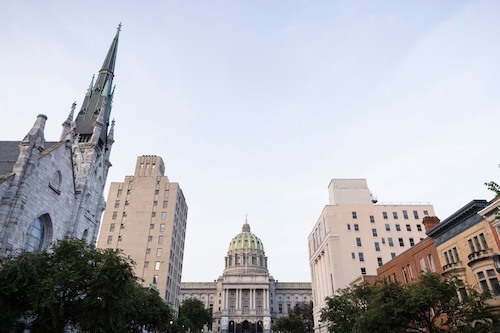Angela Couloumbis’s story for Spotlight PA
The greatest investigative and accountability journalism from throughout Pennsylvania is featured in Spotlight PA’s weekly newsletter, The Investigator, where this article first appeared.Register here for free.
HARRISBURG In 2008, as the Pennsylvania Senate was getting ready to approve comprehensive revisions to the state’s public records legislation, a state senator took the floor to call out a key provision of the measure.
According to the late state senator Jim Ferlo of Allegheny County, the historic bill would make lobbyists’ and lawmakers’ contact publicly available.
“I believe this is unquestionably a foundational piece of legislation concerning the organizations that employ professional, paid lobbyists and the important role they play in the drafting, formulation, and passage of pieces of legislation in lobbying both Houses of the Capitol,” Ferrlo said to fellow senators at the time.
During oral arguments in a high-stakes public records case filed by Spotlight PA over those very records this December, Ferlo’s comments were revived. For the first time, communications between lawmakers who draft laws and lobbyists who attempt to sway them may become publicly available as a result of the case.
The news outlet is suing the Pennsylvania Senate, which rejected a request for emails between lawmakers and a group of lobbyists made last year under the state’s Right-to-Know Law. As part of its investigation into claims of political corruption in the city of DuBois, which had hired lobbyists and benefited from large state funding, Spotlight PA had asked for the communication.
The request was quickly and abruptly rejected by the state Senate, which claimed the emails did not fit into any of the 19 types of information that the law requires the legislature to make public. These categories are specific to the legislature and mostly include financial information. State legislators deliberately avoided disclosing many documents that the executive branch regularly releases to the public when drafting the 2008 bill.
Spotlight PA filed an appeal, claiming that the public has access to lobbyist-lawmaker correspondence due to a provision in the Right-to-Know Law. The Commonwealth Court is now hearing the matter.
The provision is found in a section of the statute that addresses records that are not required to be disclosed. It states that, with the exception of letters between legislators and lobbyists, any correspondence between legislators and constituents that would reveal the identity of the writer or the purpose of the letter is exempt.
To combat the appeal, the state Senate engaged a private legal company. A panel of Commonwealth Court judges was informed by the chamber’s attorney, Karl S. Myers of Stevens & Lee, that Spotlight PA’s request for documents should be denied since emails are not expressly covered by any of the 19 types of publicly available legislative records.
He declared the conversation to be over.
Myers proposed requesting emails exchanged between lawmakers and lobbyists from state agencies. He stated that such state entities may be required to reveal them.
Jim Davy, the founder of All Rise Trial & Appellate and one of the lawyers for Spotlight PA, retorted that it was absurd to request legislative records from a commonwealth agency.
The state Senate’s categorical interpretation that no emails can ever be revealed, according to Davy, is incorrect. It is evident from the legislative history of the law, including Ferlo’s remarks, that lawmakers were aware that at least part of their correspondence with lobbyists may be made public, he added.
According to Davy, the state Senate should at the very least ascertain whether any records fall within the 19 categories of legislative records and are also susceptible to Spotlight PA’s request. This would include things like financial records that show up in emails.
Throughout the half-hour-long debate, Davy and Myers were questioned by a number of judges. Judge Patricia McCullough in particular seemed to disagree with the state Senate’s reading, at one point questioning why the legislature included the lawmaker-lobbyist email section if it wasn’t intended to make the communications public.
The case was described as highly intriguing by President Judge Rene E. Cohn Jubelirer.
Months will probably pass before a ruling is made in this instance.
Editor’s note: Couloumbis is the Spotlight PA reporter who appealed the matter to the Commonwealth Court and retrieved the emails exchanged between lawmakers.
PRIOR TO GOINGPay it forward by making a donation to Spotlight PA atspotlightpa.org/donate if this article taught you anything. Foundations and readers like you who support results-driven, accountability journalism provide funding for Spotlight PA.
Stories from Spotlight PA
Note: Every piece of content is rigorously reviewed by our team of experienced writers and editors to ensure its accuracy. Our writers use credible sources and adhere to strict fact-checking protocols to verify all claims and data before publication. If an error is identified, we promptly correct it and strive for transparency in all updates, feel free to reach out to us via email. We appreciate your trust and support!

